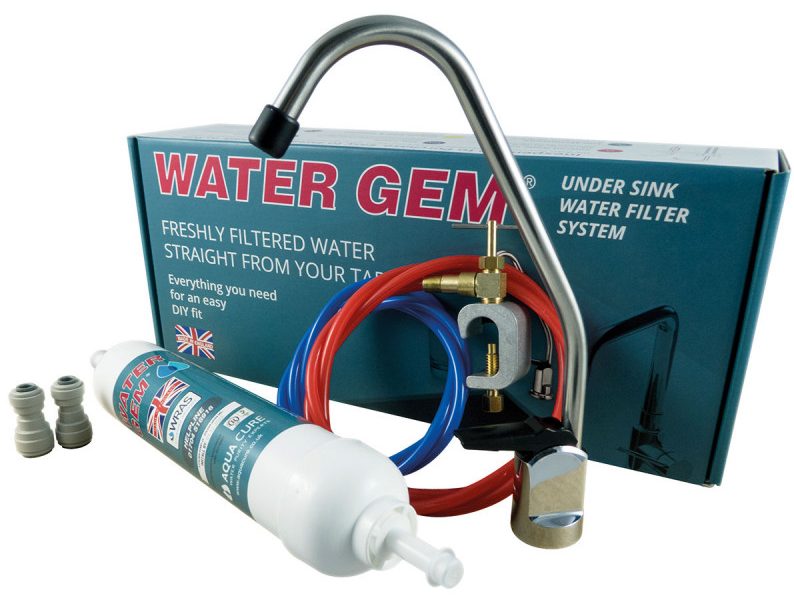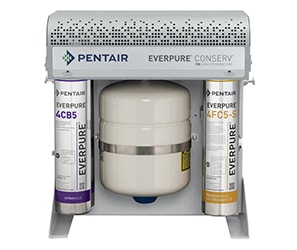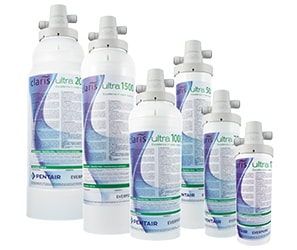We use cookies to make your experience better. To comply with the new e-Privacy directive, we need to ask for your consent to set the cookies. Learn more.
The Ultimate Guide to Water Quality
Staying hydrated is a necessity in life, but keeping water fresh, clean and tasting great is where you can really be creative! Whether it's making imaginative new cocktails, coffee flavourings or putting some zest into everyday drinking water, this guide will guarantee you have the best quality water possible to use as an ingredient.
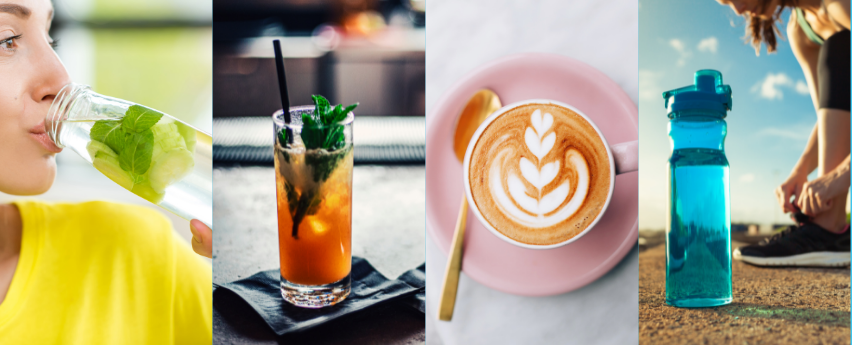
The ultimate guide to water quality addresses common water problems, details requirements for water depending on its use and provides bespoke purification solutions based on the application and sector. For example, do you know the optimum pH and mineral content of water to make the perfect coffee?
The concept of ‘water quality’ is quite difficult to define as it really depends on both the user’s personal preferences and the application the water is being used in. In general terms water quality refers to what’s in the water – its chemical, biological and aesthetic characteristics and how these relate to how it’s being used (i.e. drinking, cooking, hot drinks etc).
Often, when we talk about water quality, we are referring to drinking water – with a focus on safe water that has a pleasant taste, odour and appearance. The UK, like many developed nations, has excellent standards for its mains water supply – but that doesn’t mean that it suits everyone’s personal preferences.
There are also applications where water needs to have certain chemical or aesthetic properties changed, such as in restaurants and cafes, vending equipment, specialist medical and dentistry equipment and for private water supplies such as boreholes and wells where contaminants may need to be removed.
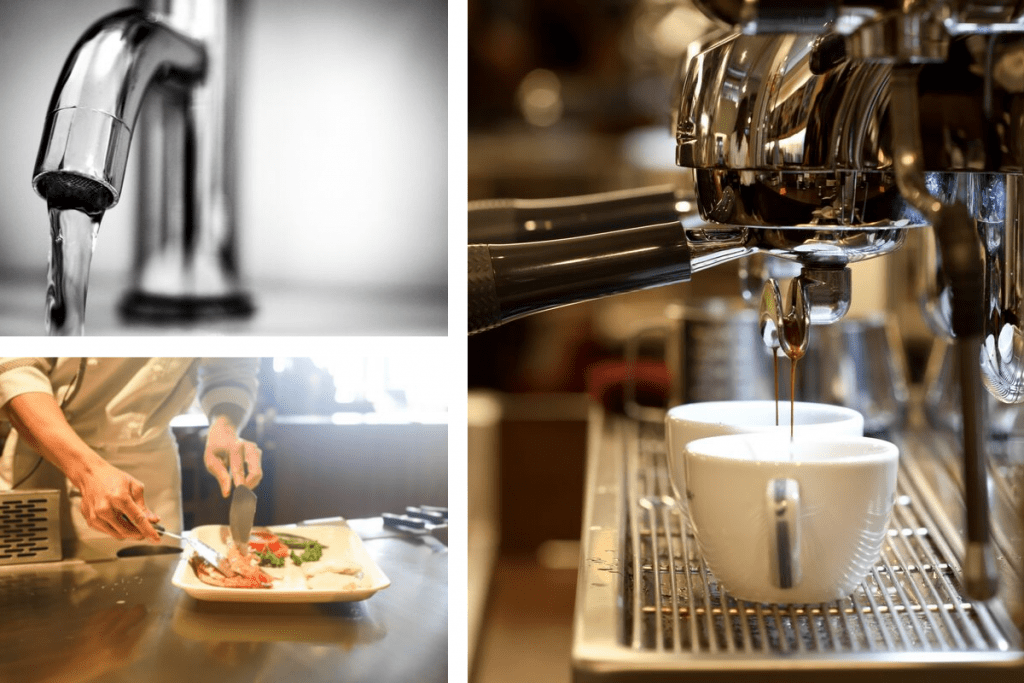
How Important is Water?
The average adult human body is 50% to 75% water and the brain is around 70% water. A drop in these levels of hydration can quickly affect our mood and concentration levels. Research has shown that a reduction in hydration levels of as little as 2% of body weight can influence our mood, increasing fatigue and reducing alertness.
Since bottled water has a well-documented negative effect on the environment, refilling a reusable bottle is increasingly seen as the best and most environmentally friendly way to stay hydrated.
Contents
You can skip to a certain section by clicking the links below:
- 1. Common Water Issues
- 1.A Hard Water/Limescale
- 1.B Chemicals & Metals (Chlorine/Fluoride/Lead)
- 1.C Sediment/Particulate
- 1.D Bacterial Outbreaks (Cryptosporidium etc.)
- 2. Water Requirements by Use
- 2.A Coffee
- 2.B HORECA – Food Service Industry
- 2.C Private Water Supplies (Boreholes, Wells etc.)
- 2.D Vending Equipment
- 2.E Other (window cleaning amp&; aquarium )
1. Common Water Quality Issues
Water is such an integral part of our daily routine, whether for drinking, cooking, cleaning or washing, that we don’t often think before turning on the tap. We’ve become so used to instant clean water on demand that most of us now take it for granted. However, understanding what’s in your water supply is something everybody who consumes the water should really know about.
Below, we have given an overview of some of the most common water quality problems, with links to potential solutions for each.
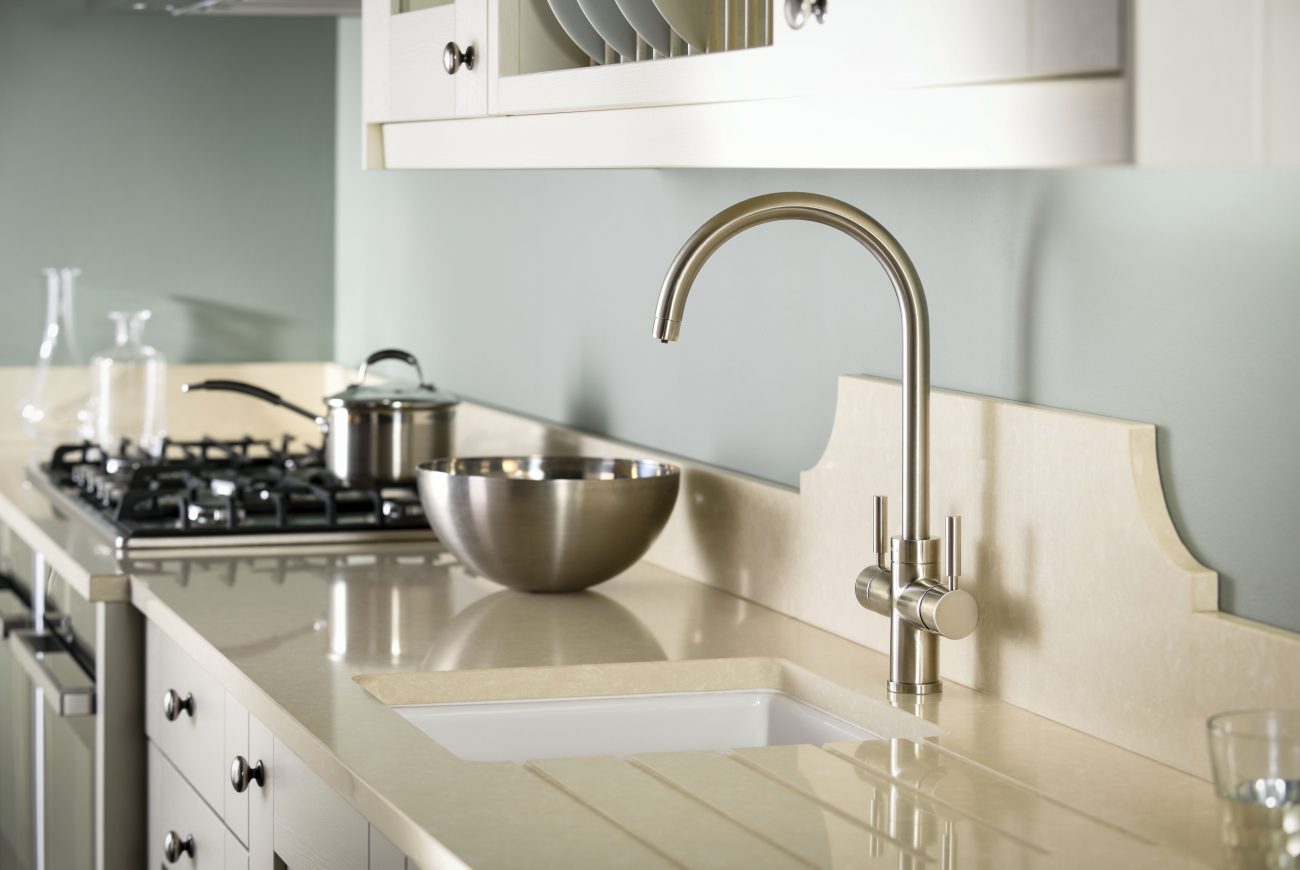
1.A - Hard Water/Limescale
What is it?
The term ‘hard water’ is used to describe water with a high level of dissolved minerals present, mainly magnesium and calcium. It is measured in parts per million, abbreviated as PPM.
| PPM | Water Hardness |
|---|---|
| 0 – 50 PPM | Is soft. |
| 51 – 100PPM | Is moderately soft. |
| 101 – 150PPM | Is slightly hard. |
| 151 – 200PPM | Is moderately hard. |
| 201 – 275 PPM | Is hard. |
| 276 – 350 PPM | Is very hard. |
| 350 + PPM | Is aggressively hard. |
Hard water is measured differently throughout the world, there is no industry standard. We have put together a handy conversion table for various global metrics.
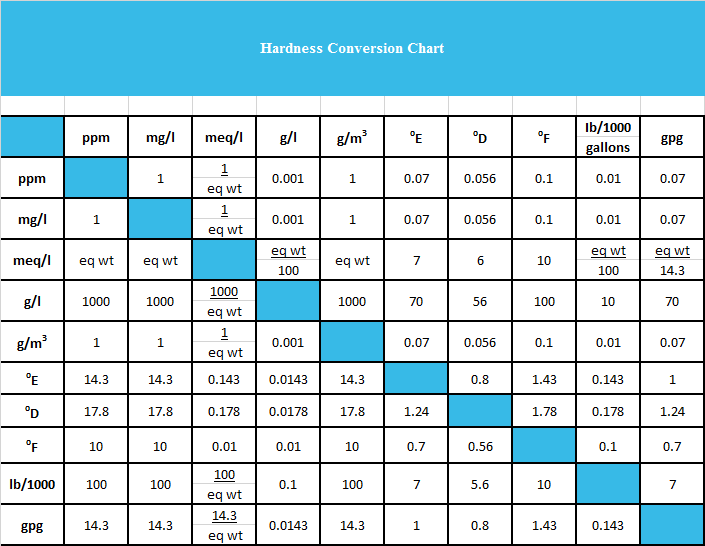
| Abbreviation | Unit Term |
|---|---|
| ppm = | parts per million |
| mg/l = | milligrams per litre |
| meq/l = | milliequivalents per litre |
| g/l = | grams per litre |
| g/m3 = | grams per cubic metre |
| oE = | English / Clarke degrees |
| oD = | German degrees |
| oF = | French degrees |
| lb/1000 gallons = | lb/1000 gallons |
| gpg = | grains per gallon |
Why does it occur?
All rainwater starts out ‘soft’, meaning it is relatively low in mineral content. It then absorbs hard minerals through contact with ground surfaces. The level of hard minerals that water absorbs largely depends on the type of rock the water comes into contact with: if the water falls on a permeable rock such as limestone, it will pick up minerals such as calcium and magnesium as it passes through, making it ‘harder’ when it eventually reaches the tap. If the water falls on an impermeable rock such as granite, it will simply run off without picking up additional minerals and thus be softer.
Extra Info:
- You can check the level of water hardness where you live using our UK Hard Water Postcode Checker.
What effect does hard water/limescale have on water quality?
In hard water areas such as the South East of England, people may experience water quality issues related to having hard water.
When heat is applied to hard water in kettles, dishwashers, washing machines and other appliances the hard minerals are left behind when the water boils, leaving a hard, chalky deposit behind. This is known as ‘limescale’ and is not only unsightly on kitchen and bathroom surfaces, but it can cause damage to your appliances. It can also coat heating elements, effectively insulating them and causing your equipment to use more electricity.
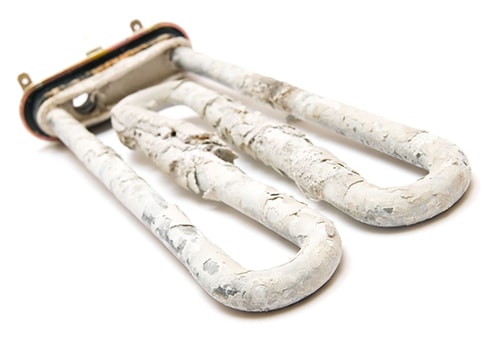
Heating element covered in limescale
This is particularly relevant for restaurants, hotels and cafes where limescale can affect the taste and appearance of beverages and can cause heavily-used appliances to break down.
Although hard water doesn’t cause any direct health issues when consumed, there have been instances where eczema sufferers have reacted badly to hard shower water hard water does not cause any direct health issues, although there have been instances where eczema sufferers have reacted badly to hard shower water. Despite the lack of health issues caused by hard water, many people find that they don’t like the taste or off-putting surface scum on hot beverages or the limescale build up on kitchen appliances such as taps.
Solutions
There are several ways you can cut down on the minerals that cause hard water and ultimately limescale:
- Water Filters - particularly those with de-alk ion exchange as this actively removes the hard water causing minerals.
A water filter used in an under the sink water filter system can can control / reduce the hard minerals in the water. Polyphosphate beads work by clinging to hard minerals such as magnesium. When attached they ride along with the mineral forming a protective barrier which prevents it from bonding to surfaces and becoming scale.
- Water Softeners
Water softeners work via a process called ‘ion exchange’. A salt-based resin inside the unit searches for and finds the hard water minerals such as magnesium and calcium and traps them inside the softener, swapping those minerals with sodium ions that can safely pass through appliances without causing scale.
- Calcium Treatment Units (CTUs)
Calcium treatment units work in a similar way to water softeners by using ion exchange to seek and remove the hard water causing minerals (calcium) in the water and swapping them for harmless hydrogen molecules, meaning the water is potable and can be used in food and beverage appliances. Calcium treatment units are an ideal solution for commercial equipment such as espresso machines, steam ovens, ice machines, water boilers and vending machines. Another positive with CTUs is the added carbon filtration which also removes the taste and odour of chlorine to further improve the water quality and taste.
1.B – Chemicals & Metals (Chlorine/Fluoride/Lead)
What is it?
The UK’s water supply contains naturally occurring chemicals and more chemicals are added during mains water treatment. These substances have been widely tested and found to have little or no harmful effect on people. The most common and harmless of these is chlorine. Though harmless, high levels of chlorine in the water can produce an unusual smell similar to that of a swimming pool which can be off putting to drink.
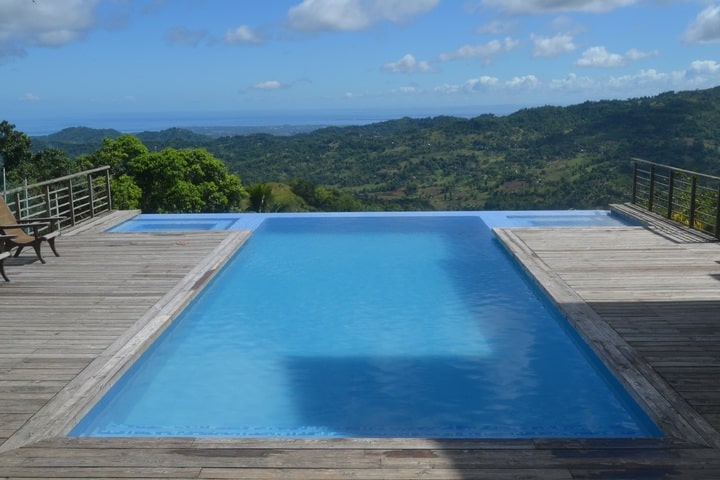
UK tap water can also contain fluoride, either naturally occurring or in some cases added artificially by the local water authority.
In rare cases, there can be instances of more harmful chemicals, synthetic hormones and drugs such as anti-depressants and cocaine by-products. Metals such as lead can also be found in the UK’s water supply, although these usually occur in isolated incidents or in very small quantities.
Why does it occur?
Chlorine is a disinfectant which is put into the water to keep it free of pathogens such as viruses and bacteria during transportation from the water treatment facility to the tap, keeping it clear and clean.
The public water supply can naturally contains fluoride, whilst around 5.8 million people in England receive water that has extra fluoride added to bring it up to the recommended levels of around 1mg of fluoride per litre of water. The presence of fluoride in drinking water is contentious however with both strong proponents and ardent critics. A low level of fluoride is recommended as it has been found to prevent tooth decay which is why it is present in toothpaste.

Lead on the other hand is undoubtably highly poisonous. Lead can contaminate drinking water when old lead piping within the public water infrastructure deteriorates. If your house was built before 1970, there is a higher risk that you have lead piping, a lead water tank or other lead fittings on the water supply leading to your home.
If your water supply becomes contaminated with lead (dangerous levels are above 0.01mg per litre according to Anglian Water) it can cause lead poisoning which manifests itself with a variety symptoms and can be particularly serious in young children.
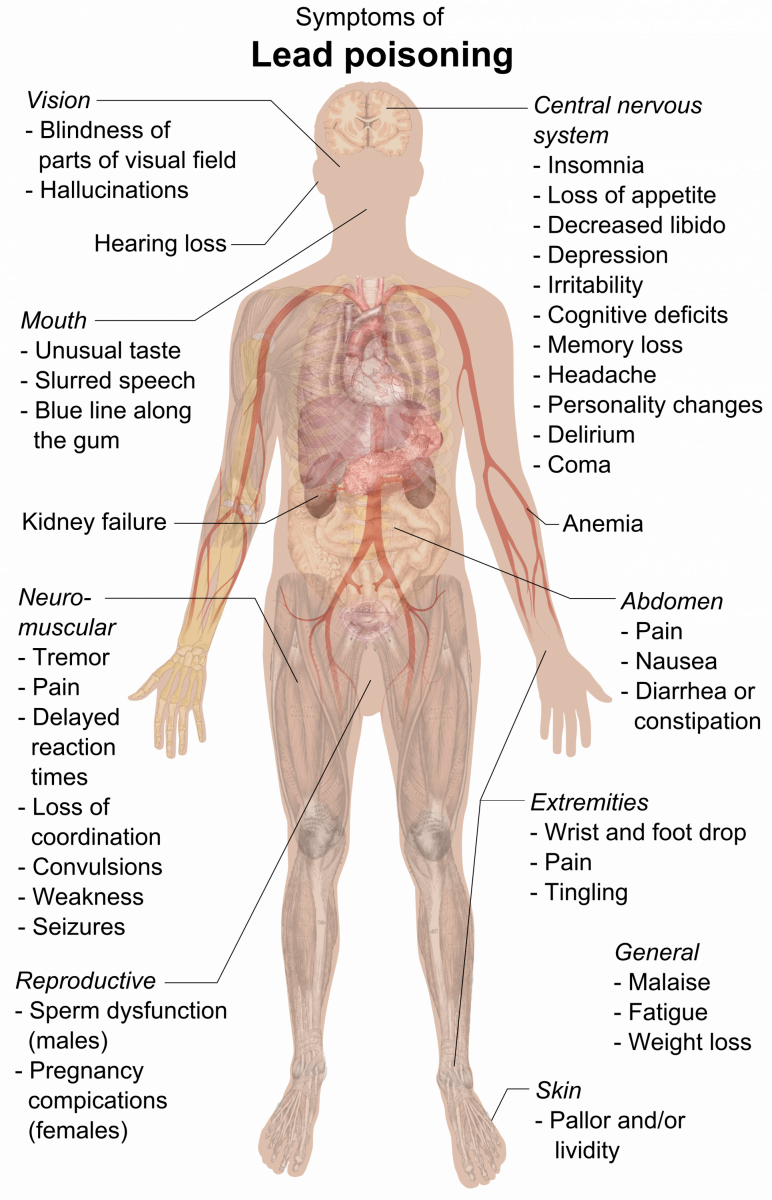
Other potential contaminants include synthetic hormones such as Ethinylestradiol (EE2) – a chemical found in the female contraceptive pill - which has been identified in the UK’s water system. This chemical is a high-strength form of the female sex hormone oestrogen, and there is some concern, yet to be proven, that it could lead to higher infertility rates or lower testosterone levels for men.
In high population density areas, greater levels of some commonly-used pharmaceuticals and recreational drugs have been found, including chemicals present in: anti-depressants; from painkillers such as naproxen and ibuprofen; epilepsy drugs such as carbamazepine; and recreational drugs such as cocaine. This occurs when the UK’s water supply system fails to remove these tiny particles as they pass from users as waste water and back into the mains supply.
- More Info on the The Truth About What’s Really in the UK’s Water Supply
What effect does it have on water quality?
There have been various scare stories in the media about the negative health effects of chlorine and fluoride in the water supply. Some examples say that chloride can have a negative impact for asthma sufferers and can cause discomfort for those who suffer from irritable bowel syndrome (IBS). The dangers of chlorine in our water have generally been dismissed in medical circles and untreated, unchlorinated water poses a significantly greater health risk than chlorinated water according to the World Health Organization.
Chlorine can negatively affect the taste and smell of water, giving it a ‘chemical’ taste to some people. This can be more pronounced when higher doses of the chemical are used if maintenance work is occurring on a certain part of the pipe network. Chlorine in beverages can also affect the taste, smell and quality. Cafe's and restaurants usually use water treatment to reduce chlorine content as well as producing feedwater which extracts the very best flavour and aroma from the coffee bean.
Chlorine is essentially the packaging that keeps the product clean during transportation. Our technical manager actually likens drinking chlorinated tap water to eating the plastic packaging your bottled water came in!

Most of the pharmaceuticals and drugs such as anti-depressant chemicals, pain-killers and cocaine are found in such small amounts that their effects, even in the long-term, are thought to be very low. A recent government report on the toxicological evaluation for pharmaceuticals in drinking water found that ‘the levels of these pharmaceuticals measured in drinking water are not anticipated to pose an appreciable risk to public health.’ However, if you think you have a heightened sensitivity to some of these chemicals or are particularly at risk, it may be worth investing in a purifying device.
Possible solutions
For high chlorine levels, a simple under-sink filter system using a carbon filter element can absorb contaminants and improve the chemical taste and odour that chlorine can impart.
If you suspect high levels of lead in your water supply, you can contact your water supplier or local authority in order to have the lead pipework in your local water infrastructure assessed and replaced. If the lead pipework in within your property boundary it may be your responsibility to replace this.
For unwanted fluoride you can utilise a ceramic fluoride reduction water filter suitable for use in the Hip Housing or the Doulton Duo Housing
1.C - Sediment/Particulate
What is it?
Sediment and particulate comprise particles such as sand, silt, clay and rust – or even larger organic matter like leaves and twigs. Although mains water in the UK may have some small pieces of sediment present, these issues are more likely to affect people with a private water supply, i.e. those using a well or borehole, a common source of drinking water in parts of Scotland, Wales and some rural areas.
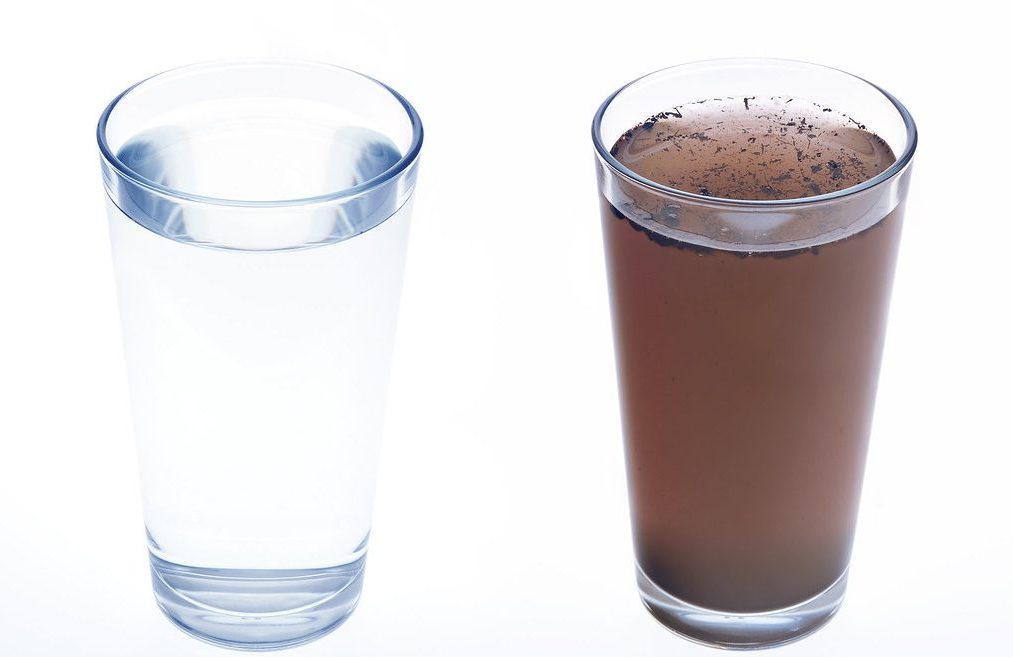
Why does it occur?
Potential causes could be that your water distribution network is old or faulty, allowing for particulate present in ground water to remain in the system when it should have been removed by filtration. Again, this is usually an issue on a private water supply, although it is possible for individual pipework leading to certain homes to degrade and remain undetected by the local water supplier.
What effect does it have on water quality?
Sediment and particulate can alter the taste and appearance of the water and in a worst-case scenario, can actually damage or block the pipework and valves in and around your home.
It is also possible for these particles to prevent water from a private supply being properly treated. If you use a UV system for example, pieces of sediment or particulate can shield contaminated water molecules from UV treatment, letting them pass through untreated.
Possible solutions
For sediment and particulate, it is recommended to use a mechanical water filtration system. A good example of this would be a water filter housing with a specialist drop-in sediment filter.
Extra Info:
- More Info on Common Water Problems & Solutions
1.D - Bacterial Outbreaks (Cryptosporidium etc.)
What is it?
Mains supply water is generally free of bacteria and other potentially harmful micro-organisms. Regular testing means outbreaks are rare, although not unheard of. Recently, the UK has seen localised outbreaks of E. coli, cryptosporidium and legionella, which have generally meant the mains supply is undrinkable without pre-boiling or filtration.

Why does it occur?
For the municipal water supply, bacterial outbreaks can occur when part of the testing apparatus is faulty and harmful bacteria is not identified. This only happens very rarely but localised outbreaks can still occur, brought on by old or faulty water pipes, seepage or even poor water filter maintenance.
The main dangers for bacterial outbreaks in water come when people rely on a private water supply such as bore-holes, wells or streams. Groundwater used for private supplies is more likely to become infected with pathogens (disease-causing organisms) through contamination by human or animal faeces or urine. This can lead to water-borne infections such as cholera, typhoid, infectious hepatitis, gastroenteritis, cryptosporidiosis and dysentery. In addition, as supplies often undergo a less rigorous testing and sterilisation procedure than the municipal supply, they are more prone to bacterial outbreaks and thus may require additional water purification measures.
What effect does it have on water quality?
Bacteria and certain micro-organisms can have a hugely detrimental effect on human health, causing a range of illnesses and diseases of varying seriousness. Any outbreaks should be reported to your local water authority or supplier immediately.
Possible solutions (water filter, softener etc.)
When localised outbreaks occur in a municipal supply, the local authority will usually advise on the best course of action (boiling water, avoiding completely etc). There are also various options you can take to prevent bacteria from entering the water supply in the first place, with two of the most common being ultra-fine mechanical filtration and ultra violet (U.V.) sterilisation.
Filtration:
To filter bacteria, an ultra-fine filter such as a ceramic filter will be effective. Ceramic filters have an extremely fine pore structure, so fine in fact that most bacteria cannot physically pass through! A quality ceramic filter can guarantee the removal of up to 99.99% of pathogenic bacteria and cysts including cryptosporidium.
U.V. Sterilisation:
A UV system uses the sterilisation properties of UV light to expose and thus kill bacteria and micro-organisms in your water. It is the recommended way to treat the potentially risky water from a private water supply.
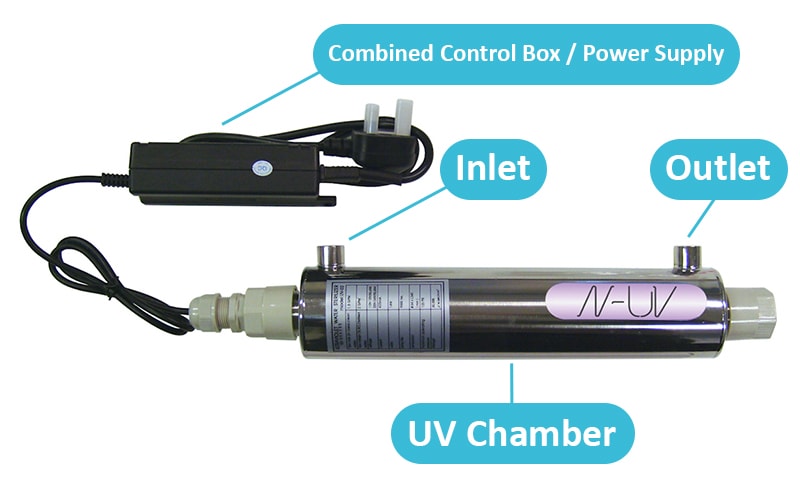
Extra Information:
- More Info on How do Water Filters Work?
- UV Steriliser buyers guide
2. Water Purity Requirements by Use
Different applications require different levels of water purity. In general, equipment longevity (achieved with scale reduction or inhibition) is the primary goal when specifying water treatment for foodservice applications. For speciality coffee however, the flavour of the coffee can be affected, sometimes dramatically by the amount of and type of hard minerals present in the water used.
2.A - Coffee
Requirements
Coffee experts will tell you that using the best water for coffee is one of the most important factors when brewing the perfect coffee. World Barista Champion Dale Harris explained to Aqua Cure about the importance of balance in the pH of the water and how the “quality of water has a huge impact” on taste and flavour as well as how consistent feed water helped him become the 2017 World Barista Champion.
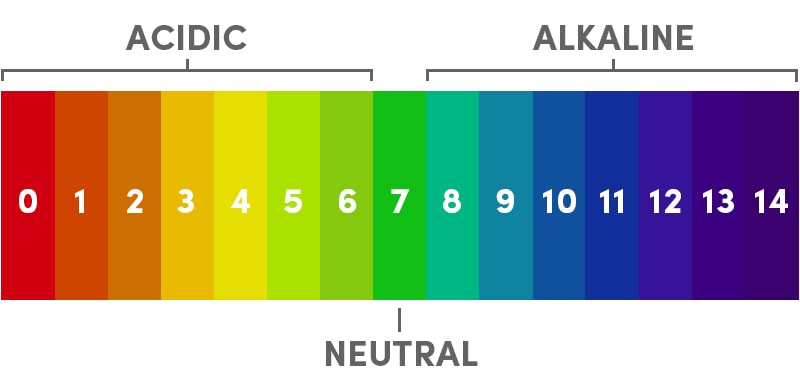
As with other foodservice applications, hard feed water can cause scale to form in boilers, on heating elements and in the internal pipe-work inside coffee / espresso machines. Scale can form an insulating barrier on heating elements meaning they have to work much harder to heat the same volume of water. This can not only affect efficiency and performance but can cause the heating element to burn out prematurely.
However, there is another factor to consider when brewing coffee: flavour. Finding the right amount of mineral hardness in the water is necessary to aid extraction of the oils (and thus flavour) from the ground coffee bean. Brewing with water that’s too soft results in a flat tasting coffee. As such, it’s a fine balancing act when it comes to treating water for speciality coffee applications with water needing to be hard enough to achieve proper flavour extraction but no so hard that it scales up expensive espresso equipment.
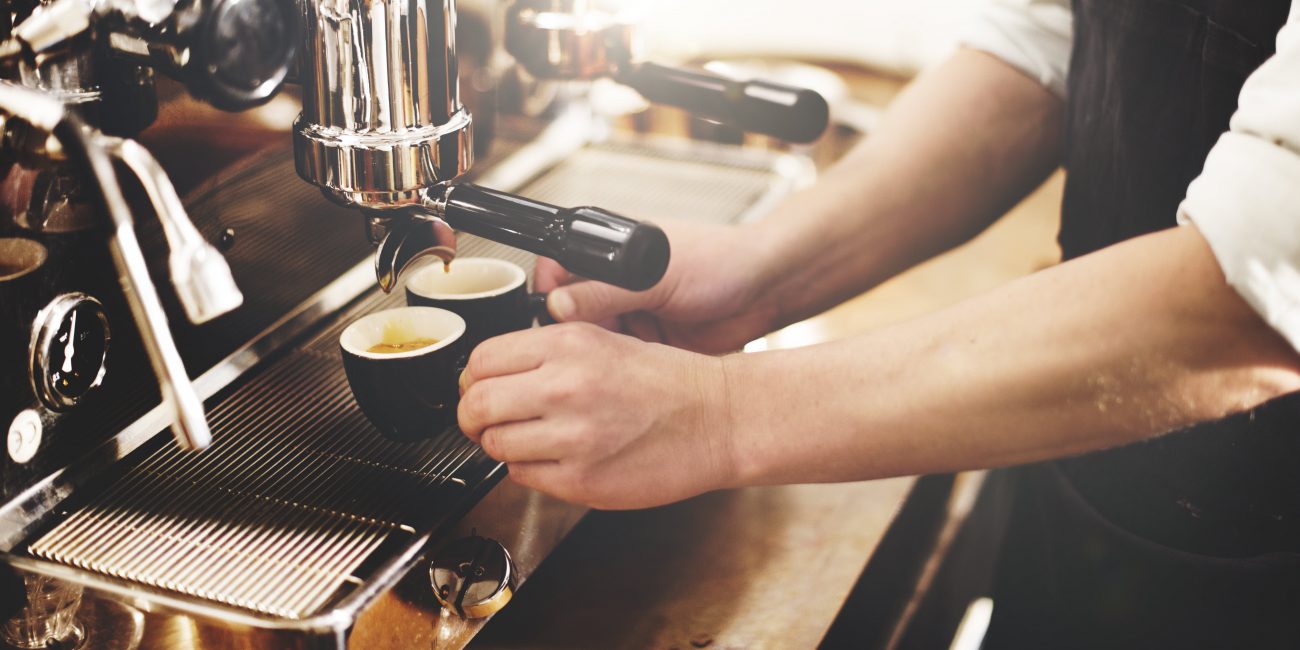
Water Treatment: The Coffee Lover's Guide
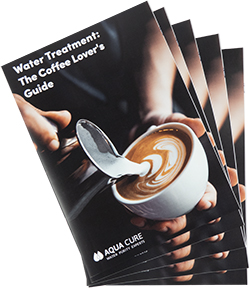
The correct water recipe is vital for making the very best coffee, which makes water treatment an essential part of creating that perfect brew. Find out more about the specific solutions for coffee with our free coffee lovers guide to water treatment.
Solutions
Due to these particular water requirements, there are a number of recommended water purity solutions for the coffee sector:
Reverse Osmosis Systems for Coffee Machines: Many speciality coffee roasters and coffee shops are now using reverse osmosis systems for espresso machines. Reverse osmosis is one of the most comprehensive forms of water filtration available and strips up to 99.9% of contaminants out of the water. This results in water with no mineral content at all, effectively giving the user a blank sheet with which to start over. The latest reverse osmosis systems for the coffee market such as the Pentair Everpure Conserv 75E feature a remineraliser cartridge which blends the right balance of minerals back in, giving the user a very high level of control over mineral content in order to achieve the perfect balance.
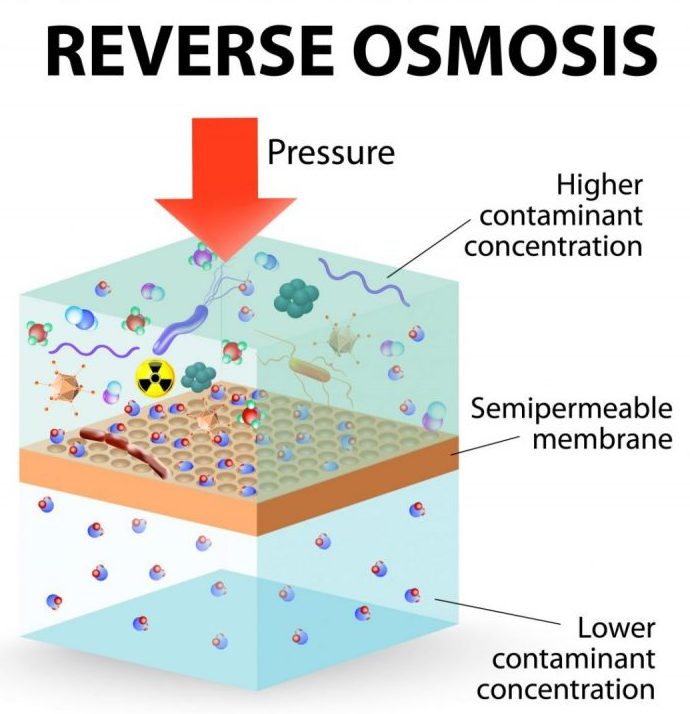
Water Filter Cartridges for Coffee Machines: Speciality filter cartridges can help reduce high mineral and acidity levels and can help tailor coffee machine feed water with regard to pH and carbonate hardness.
Extra Information:
Read more: Why Reverse Osmosis Makes Great Coffee
Read more about The Anatomy of the Perfect Coffee
2.B - HORECA – Food-Service Industry
Requirements
The Hotel, Restaurant and Café sector, also known as HORECA, has exacting standards when it comes to water quality.
This industry relies heavily on customer satisfaction and poor water quality can be one cause for customers to be unhappy with a service.
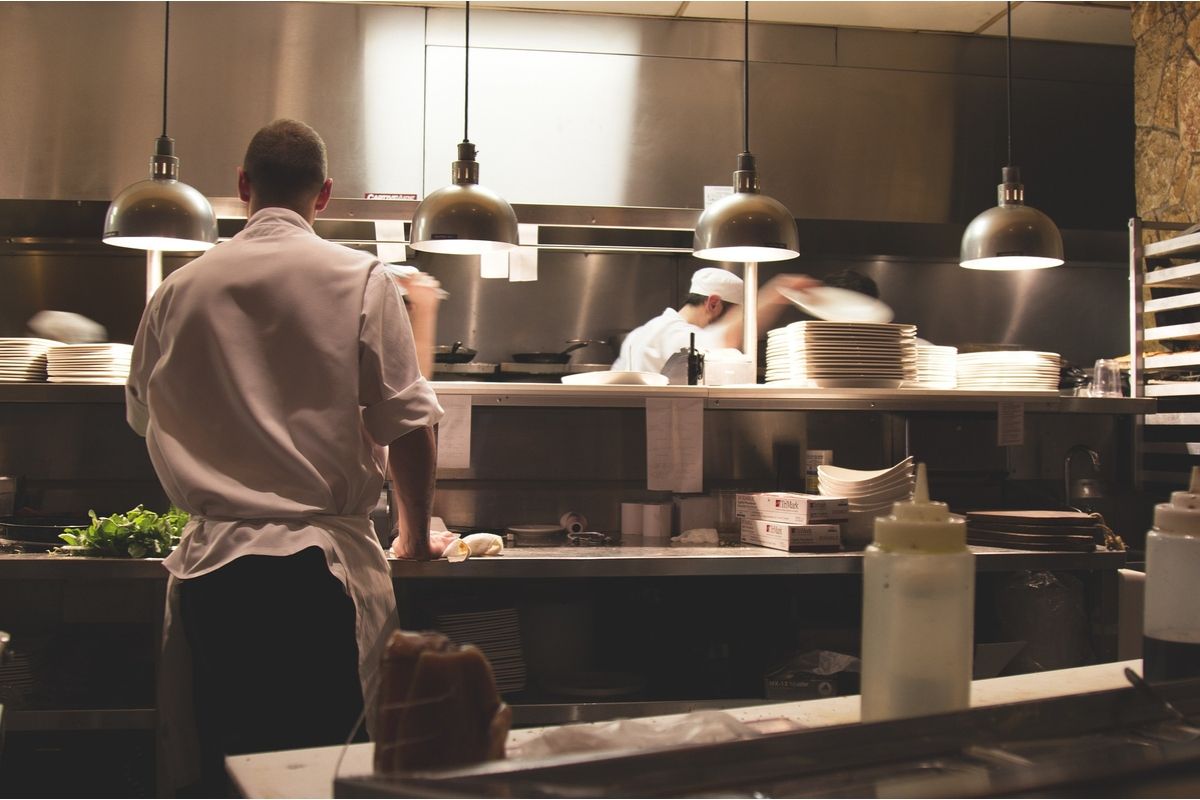
For the hospitality industry, hard water can also cause several issues such as:
- Stained and spotty glass and tableware.
- Reduced efficiency of water heaters, leading to increased running costs.
- Key water-fed equipment failure and increased maintenance costs.
- Limescale and water marks on guest bathrooms making cleaning more time-consuming.
- Cloudy ice cubes and expensive ice maker maintenance.
- Break down of water-fed combi ovens and other commercial steam cooking equipment.
Restaurants and other HORECA establishments may also have issues disposing of fats, oils and grease [FOGs] from their kitchens. If a business is found to be polluting the water supply by disobeying the guidelines on FOGs you can risk fines or even closure.
Solutions
For reducing limescale build-up, a specialist limescale inhibitor that treats your mains supply water could suffice in relatively low volume applications.
For larger premises, a large-capacity commercial water softener can reduce scale build up in various appliances including dishwashers, glasswashers, laundry equipment and heating systems. Cleaning glassware and cutlery with softened water not only benefits the appliance but reduces spotting and streaking caused by dissolved minerals in the water.
A water softener can also be of benefit for in-house laundry services. Washing bed linen with softened water uses less soap and detergent and leaves fabrics feeling softer.
HORECA establishments with catering facilities might consider an automatic grease trap which can help maintain compliance with increasingly strict legislation regarding the disposal of waste fat, oil and grease. Discharging waste oil into the sewer network can lead to the build-up of fatbergs with catering establishments increasingly being fined if found to have contributed excessively.
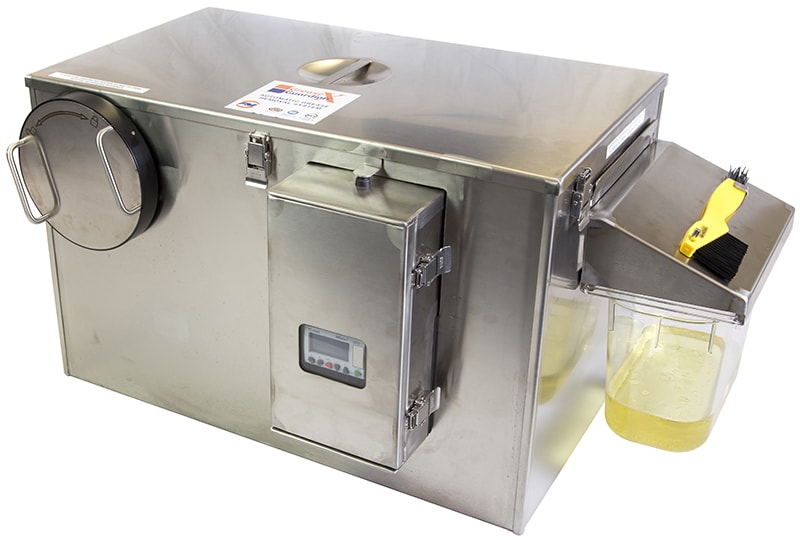
Read more about What are Grease Traps and How do They Work?
2.C – Private Water Supplies (Boreholes, Wells etc.)
Requirements
Many premises in remote areas, particularly across Scotland, Wales and some rural areas rely on a private water supply such as a borehole, well or stream.
These are monitored and maintained by the property owner and as such, there is the potential for less rigorous monitoring to lead to water quality issues.
In particular, bacterial outbreaks can occur – with the danger of the water supply being contaminated with pathogens such as cryptosporidium and E.coli which can pose a serious health risk.
Although bacterial outbreaks are the biggest concern for people using a private water supply, issues with hard water and limescale can still be present. You may also expect to see a greater amount of sediment, particulate and turbidity than in the mains supply, meaning silt, sand, leaves, twigs and other organic matter can find its way into your drinking water.
Solutions
People relying on a private water supply will want to regularly test their water using a water testing kit. A detailed water analysis can inform your decisions regarding the water purification methods required. A water softener can also be utilised if living in a hard water area.
For sediment and particulate, a mechanical water filtration system such as a water filter housing with a specialist drop-in sediment filter is recommended.
A UV system uses UV light to kill bacteria and micro-organisms present in water, including but not limited to:
- E. Coli
- Pseudomonas
- Rotavirus
- Legionella
- Clostridium perfringens
- Coliform bacteria
For more information, see our UV Steriliser Buyer's Guide.
2.D – Vending Equipment
Requirements
Whether it’s for hot or cold drink applications, water-fed vending equipment can be affected by several quality issues. As with coffee machines and domestic kettles, hard water can cause limescale build-up on heating elements and in internal pipework causing equipment to run less efficiently and even break down. The end product can also be improved by the reduction of chlorine taste and odour while filtration also prevents any sediment from entering and damaging the machine.
Untreated water in beverage vending machines can lead to:
- Sediment, scum, unpleasant residue or off-putting odour and colour caused by high mineral content or excessive chlorine.
- Hard water can lead to limescale which can cause hot drink vending machines to run less efficiently or even clog up and break down, leaving you with costly repairs.
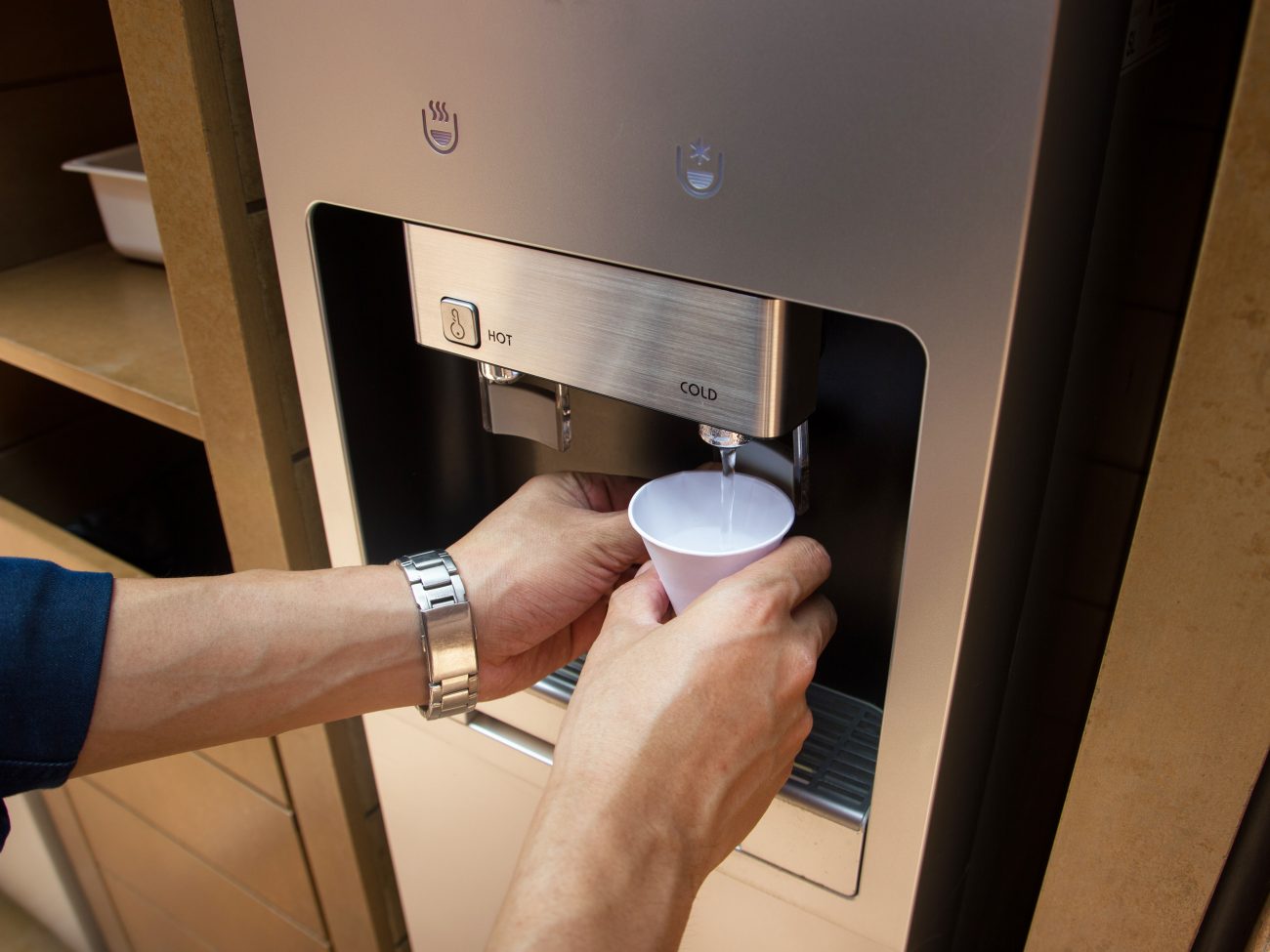
Solutions
There are different solutions for vending equipment depending on whether you are vending hot or cold beverages; with hot drink vending machines more susceptible to limescale build-up as this is facilitated by heating water. Solutions for hot drinks vending include high capacity water filters with added scale inhibitors such as the Everpure 2CB5-S and 4CB5-S water filter cartridges.
For cold water vending machines a similar range of high-capacity water filters are suitable, you will need a water filter with a large capacity due to the potential for high usage – take a look at our cold drinks vending solutions to find a filter that matches your expected water usage.
2.E– Other
Requirements & Solutions
There are countless highly specialist water treatment methods for different industries, we will try to address a few of them below:
- In some healthcare, dental and veterinary applications, extremely pure water may be required for supplying water for autoclaves and to reduce the risk of contamination and infection. A reverse osmosis system can supply water with 99.9% of impurities removed and provide water that is as close to pure as you’re going to get.
- Water Coolers: A POU (point-of-use) water cooler is generally fitted with an inbuilt water filter to reduce impurities and improve the taste and odour.
- Window Cleaning – TDS (total dissolved solids) can affect the quality of the window cleaning – leaving marks, spots or streaks on otherwise clean windows. There is a range of window cleaning equipment available to combat this.
- Aquariums – Fish and other aquatic organisms may develop health problems if they are kept in dirty water, so there are a wide range of specialist filters, sanitising wipes, gloves, paper roll and more designed to keep aquatic environments clean.
In Summary
Whether it’s for drinking, for foodservice applications or for a fish tanks, it’s clear that we should be aware of the quality of our water. This is particularly true for drinking water because of our reliance on water to keep us hydrated.
Top Tips:
Find out if you live in a hard water area here: Check my Postcode
You can check your water alkalinity & PH with our easy-to-use Dual Test Strips.
We hope you have found the information you are looking for, and – if not – feel free to get in touch with Aqua Cure’s team of water purity specialists today!
You Might Like:
How Exactly do Filters Work?
Dont know the difference between a micron and a moose? Not sure about which filter type is best for you? Learn more about how water filters actually work.
What’s Really in the UK’s Water Supply
The UK’s municipal water supply is among the best in the world and we all take it for granted. But what's really in the tap water we drink every day?


